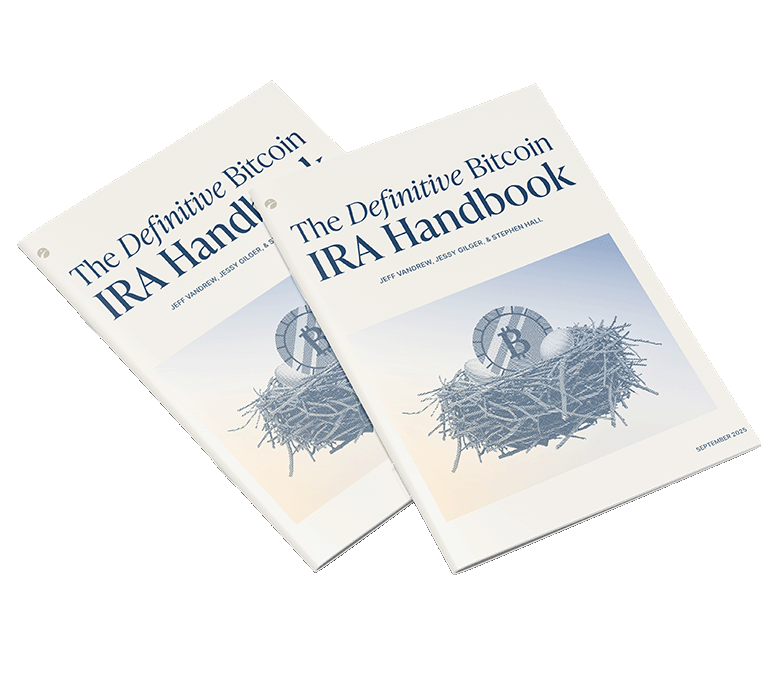
The definitive bitcoin IRA handbook


At Unchained, we’re commonly asked by clients whether holding bitcoin in an IRA is “IRS-approved” and whether the IRS may “ban bitcoin IRAs in the future.” The short answer: Holding bitcoin in an IRA is not prohibited, and any changes to this would require an act of Congress. To appreciate why this is, you first need to understand the legal framework behind IRAs in the U.S.
The Internal Revenue Code (IRC) does not list which types of investments are allowed within retirement accounts. It is a negative statute in this regard; it instead lists investments that are not allowed within a retirement account. Any investment that is not prohibited is therefore allowed.
Several sections of the IRC address prohibited investments in a retirement account. The first of these is IRC 408(a)(3), which, in a straightforward manner, prohibits an IRA from owning life insurance. This does not raise any issues for bitcoin IRAs.
The next of these sections is section 408(m), which bans investments in collectibles. IRC 408(m)(2) defines a “collectible” as:
(A) any work of art,
(B) any rug or antique,
(C) any metal or gem,
(D) any stamp or coin,
(E) any alcoholic beverage, or
(F) any other tangible personal property specified by the Secretary for purposes of this subsection.
Bitcoin is very clearly not a collectible under subsections (A) through (E). With regard to subsection (F), the Secretary (of the Treasury) is only empowered to by regulation define tangible property as a collectible. Because bitcoin is intangible property, it would be outside the legal authority of the Secretary to designate bitcoin as a collectible under this subsection.
The last, and most comprehensive, section of the IRC that bans certain retirement investments is IRC 4975, also known as the Prohibited Transaction Rules. The six Prohibited Transactions are:
A “disqualified person” is generally the IRA owner as well as certain people related to him. As you can see, none of these provisions would ban bitcoin investments so long as the IRA does not enter into any bitcoin purchase, sale, or lending transactions with a related party and the IRA bitcoin is never used as collateral for any kind of loan. An IRA that merely holds bitcoin purchased from an unrelated third party does not come under the rule.
While bitcoin is clearly not a prohibited investment in an IRA, there remains a requirement under IRC 408(a)(2) that all IRAs have a custodian. The custodian must be a licensed financial institution.
Unchained has partnered with Fortis Bank to fill this custodian role. In McNulty v Comm’r, 157 TC 10 (2021), the Tax Court recently expounded on what role a custodian must play in an IRA’s investments. We wrote a separate article explaining how Unchained complies with the custodial requirement of IRC 408(a)(2) as interpreted by McNulty.
This does not mean IRA investors need to give up control of the keys within their IRA. With an Unchained IRA for instance, Fortis Bank—the official custodian—delegates key control to the IRA holder, which is managed via a dedicated Unchained vault. That dedicated vault is properly titled to the IRA, and all transactions are actively monitored by the custodian (through Unchained) for IRS compliance.
In short, Unchained IRAs comply with IRC 408(a)(2) while also allowing Unchained clients to maintain control over their bitcoin’s private keys.

We believe that an Unchained IRA is as sustainable as any other type of retirement account under current law. Depending on the specific circumstances, you can hold many kinds of unconventional investments in an IRA, including real estate, private stock, stock options, as well as bitcoin. And while laws can change, an act of Congress would be required.
This article is provided for educational purposes only, and cannot be relied upon as tax advice. Unchained makes no representations regarding the tax consequences of any structure described herein, and all such questions should be directed to an attorney or CPA of your choice.